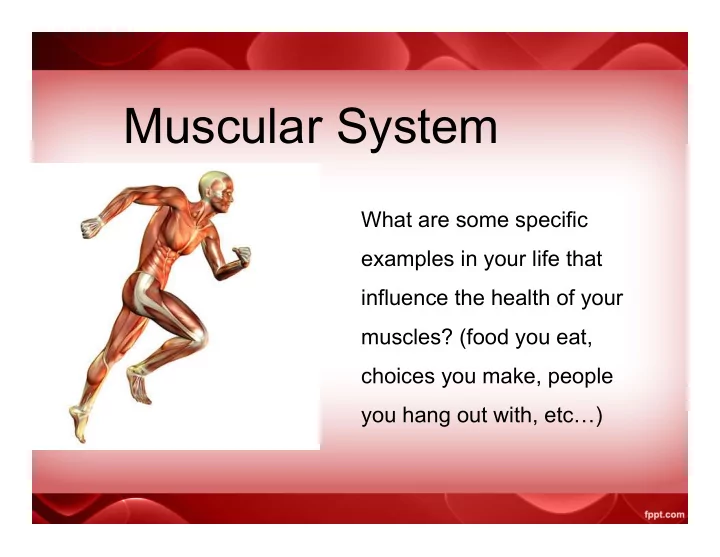

Muscular System What are some specific examples in your life that influence the health of your muscles? (food you eat, choices you make, people you hang out with, etc…)
What are Muscles? • Muscles are elastic and allow a wide range of motion • The elasticity allow muscles to move bones and organs that they are attached to • Some muscles in your body are always at work – Muscles are used for breathing, to make your heart beat, and to move food through your digestive system – You don’t “tell” your muscles to do this, do you? • Some muscles are under voluntary control – you are aware you are controlling them
Your Muscular System Muscles attached If you stumble and to bones support lose your balance, your body to your muscles pull provide stability you back to a stable and balance position Muscles cover your Muscles work to Muscles cover abdomen, chest, keep your body at most of your and back to protect its normal skeleton like a your internal temperature layer of padding organs (37°C)
How do Muscles Work?
Types of Muscles • Smooth Muscles – Muscles that act on the lining of the body’s passageways and hollow internal organs • Found in the: digestive tract, bladder, lining of the blood vessels, and passageways that lead to the lungs • These muscles are INVOLUNTARY
Types of Muscles • Skeletal Muscles – Muscles attached to bone that cause body movements – Most of your muscle tissue is skeletal – Almost all skeletal muscles are under voluntary control
• One muscle contracts while the other relaxes – Flexor • the muscle that closes a joint • I.e. Biceps – Extensor • the muscles that opens a joint • I.e. Triceps
Types of Muscles • Cardiac Muscles – A type of striated muscle that forms the wall of the heart – It is involuntary – It is responsible for the contraction of your heart **The heart contracts rhythmically about 100,000 times each day**
Caring for Muscles • Muscles that remain unused for long periods of time will atrophy – decrease in size and strength • To care for your muscular system and maintain muscle tone: – Get regular exercise – Eat high protein foods to build muscle – Practice good posture to strengthen back muscles – Use proper equipment and wear appropriate clothing to protect muscles during physical activity – Warm up properly and stretch before exercising and cool down after exercising to prevent injuries
Muscular Problems • Bruises – Areas of discolored skin that appear after an injury • Caused by ruptured blood vessels beneath the skin that leak • Muscles Strains or Sprains – Muscles are stretched or partially torn from overexertion • Tendinitis – Inflammation of a tendon • Caused by injury, overuse, or natural aging
Muscular Problems cont... • Hernia – An organ or tissue protrudes through an area of weak muscle – Commonly occur in the abdomen from straining to lift a heavy object
Muscular Problems cont... • Muscular Dystrophy – An inherited disorder in which skeletal muscle fibers are progressively destroyed – There is no cure – With early detection, muscle weakness can be delayed through exercise programs
Recommend
More recommend